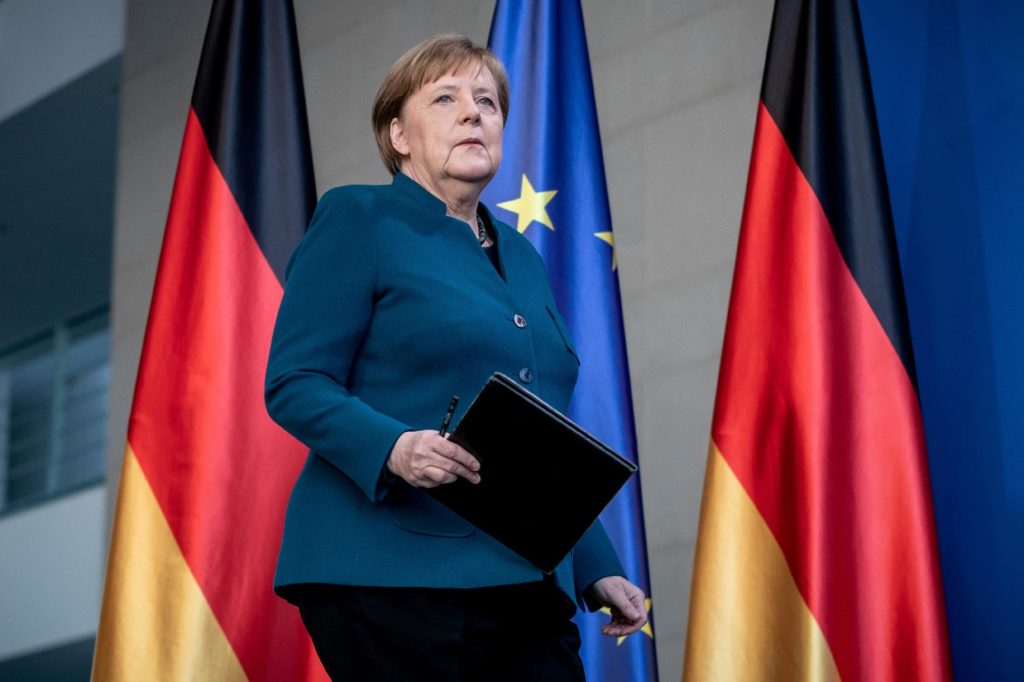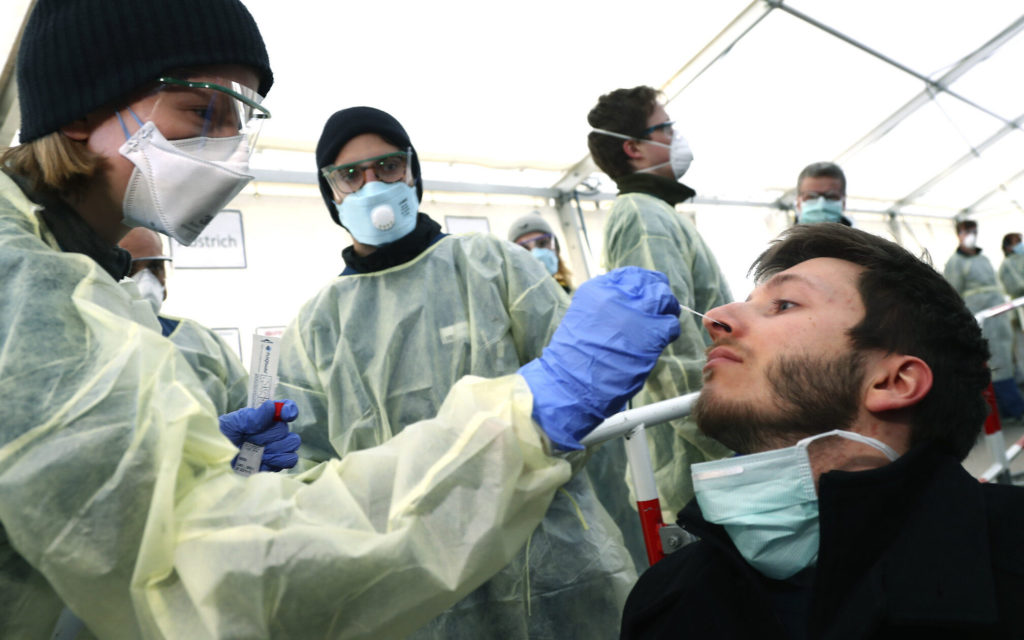RIO DE JANEIRO, BRAZIL – The world may collapse out there, but in Germany’s parks and streets, the new normality is gaining ground. Families line up to buy ice cream, and young and old lie on the grass to enjoy the sunshine they missed in winter.
The shops reopened last week, while half the world looks to Berlin wondering what Germany has done so positively in this crisis. The number of coronavirus infections continues to grow -152,438-, but the wretched curve has flattened and the health system is holding up.

It even welcomes patients from other European countries. The death toll, at 5,500, is still much lower than in other countries, without the population having been completely confined at any time. However, Berlin is urging people to be cautious and avoid self-complacency in the face of the risk of a potential relapse.
“The government has done very well [crisis management]. It has told the truth from the outset. [Angela] Merkel explained that this would affect 60 to 70 percent of the population, and we understood that the problem was serious and that we had to keep our safety distance,” explains Tamer Osman, a designer from a small Berlin boutique that now intensively manufactures printed fabric masks.
This small entrepreneur is not alone. The Germans have closed ranks around a government that until recently threatened to call early elections and a chancellor (prime minister) regarded as little more than a “lame duck”.
Admiration for German management has skyrocketed on both sides of the Atlantic. The German minister of health was interviewed by TVs around the world, while the global ‘Merkelmania’ comes back to life from the coronavirus. The Berlin government is averting any possible triumphalism because, as Merkel cautioned this week in the Bundestag (parliament): “We are not in the final stages of this crisis. We are still in the beginning”.
Merkel described the German experience as a “fragile and partial success”, and repeated that the country is walking on “thin ice”, which can break at any moment. As well as prestigious German virologists, Merkel fears that the rush to reactivate economic life will lead to a relapse, a second wave of Covid-19, which would be even more dangerous.
Merkel, a doctor of quantum chemistry, has been praised both inside and outside Germany for her management. Faithful to her style, she has been slow to react. When it was already clear that the coronavirus was much more than just any flu, in Berlin they were still scheduling soccer matches. When she finally addressed the citizens, however, she earned their trust with a direct message, devoid of embellishment or excessive beating around the bush, and based on science at all times.
She herself underwent voluntary quarantine at home after being in contact with a doctor whose test had come back positive, leading with a good example. In mid-March, she addressed the nation on TV for the first time in 14 years (in addition to the traditional Christmas message) to explain that Covid-19 was the country’s greatest challenge since World War II.
“Merkel is uniquely prepared for this crisis because of her rational temperament and ability to reach consensus,” says Constanze Stelzenmüller of the Brookings think tank.
The researcher recalls that the German parliamentary system limits, particularly in the case of a pandemic, the head of the federal government’s room for maneuver, and “forces any chancellor to reach consensus with the Länder [regions] but also with the coalition partners, and this is where the leadership ability comes into play”.
Those who know Merkel stress that she is rational and listens very carefully, advises herself to then weigh up the arguments, and make decisions step by step. The chancellor is currently advised by panels of multidisciplinary teams, where in addition to virologists there are psychologists, jurists, and education specialists.
Citizens look around and see Donald Trump, Vladimir Putin, and Boris Johnson, and they appreciate even more a politician who has not resorted to warmongering rhetoric or decreed a state of exception. Limiting the restriction of freedoms as much as possible was one of Merkel’s premises, a prime minister who grew up in the [East] German Democratic Republic.
“The surveys have for weeks reflected the feeling that the government is doing things right. There’s no widespread panic or fear,” says Meter Matuschek, a researcher at Forsa. According to him, this is partly explained by science-based political decisions in a country that relies on its universities and scientific institutions.
According to a ZDF survey published last Friday, approximately 90 percent of respondents think the government is managing the crisis well. In addition, 83 percent rated Merkel’s management positively. “There’s near unanimity. The government could pass any law it wanted,” Matuschek says.
Merkel’s Christian Democratic Union (CDU), with 39 percent of the voting intentions, now enjoys its largest support since 2017.
But not all that glitters is gold. The pandemic has also served in Germany as a dark room, revealing fortresses as well as institutional shortcomings. It has highlighted the deficiencies of the education system, for one. And above all the delay in the digitalization process in a country with surprising deficiencies in Internet coverage.
It also emphasized the dependence on China and other countries when it comes to supplying masks and personal protective equipment for health professionals.
Jan Techau, director of the German Marshall Fund’s Europe program, however, emphasized the significance of institutional cooperation, greased with some improvisation in the 2015 crisis when more than a million refugees landed in Germany. Those national emergency months served as a general rehearsal for a country that was forced to strengthen municipal, regional, and national cooperation.
“Now there’s once again a mentality of cooperation in the face of the crisis, in a country with a well-developed organizational capacity,” he says.
This cooperation is reflected in politics, where until now there has been a pact of implicit non-aggression and support for the government. “This kind of crisis fosters Germany’s deep-rooted desire to live in harmony. The Germans like the great coalitions, the coordination between employees and employers… A crisis like this is experienced in Germany as an opportunity to leave political disputes aside. Although, of course, it won’t last forever,” says Techau.

Number of beds
Analysts agree that Germany’s relative success is also related to the fact that the virus has come at a time of economic and health care boom. Since the onset of the epidemic, Germany has increased the number of ICU beds from 28,000 to 40,000, of which 12,000 are still empty. The German strategy is to break the chain of contagion by conducting massive tests – in the future, using a mobile phone app.
The Robert Koch Institute reports that millions of diagnostic tests have been conducted in 161 laboratories across the country. Currently, between 300,000 and 400,000 are performed weekly. Since mid-January, researchers at Charité University Hospital have implemented the production of these tests and shared them with the other laboratories.
The German research capacity has been coupled with a powerful industry, which has allowed the laboratories to be close to manufacturers and with access to supplies, explains Ricarda Milstein from Hamburg’s Health Economy Center.
By the start of February, the first bureaucratic procedure was ready, which was crucial for laboratories to be able to send test invoices to lending associations, says Milstein.
According to the press last week, the plan now is to reach 4.5 million tests per week. Merkel reiterated the goal on Thursday before the Bundestag: “The experts tell us: tests, tests, tests”.
Virologist Jonas Schmidt-Chanasit, from the Bernhard-Nocht Institute in Hamburg, ponders. “Germany spent a lot of money on tests, but the vast majority were negative. The key is to use these tests strategically. It’s not just about quantity,” he says. Only 7.5 percent of the tests so far carried out in the country have tested positive.
The government never tires of reiterating that accuracy is a key element in this crisis. Thoroughness is particularly critical to break the chain of contagion. When an individual is diagnosed positive, the people with whom he/she had contact in the two preceding weeks are alerted to quarantine and thus break the fateful chain.
This methodology has been in place at the local level since the first day. On January 27th the first outbreak near Munich was detected, thanks to a Chinese worker who warned that she was contaminated after giving a seminar at the headquarters of the German company where she works.
The employees and the people around her were tested and isolated to stop the outbreak and prevent a silent spread of the virus. “[The outbreak] was soon detected. Otherwise, we would be like Italy or Spain today,” says Schmidt-Chanasit.
The virologist also stresses the crucial role played by local authorities. Specifically, he highlights the large network of public health centers throughout the country, which in some cases have their own laboratory and whose professionals have visited homes and implemented isolation measures designed to the different needs.
The expert also considers a factor that has been underestimated in Germany’s purported success: luck. He recalls that many of the first cases of infections were among youths returning from ski trips – and this has meant that the virus has taken longer to spread among the elderly, as well as keeping the death rate very low for weeks.
Since then, the rate has not stopped rising and currently stands at 3.6 percent. “Eighty percent [of success] was luck, and the remainder was good management. Particularly since no radical confinement measures were required. Specific actions were taken to prevent social contact and the virus from being spread because we also need to take into account the negative effects of confinement on health,” he says.
Schmidt-Chanasit echoes what is now almost a mantra in Germany. “We’re just at the beginning of an epidemic that we don’t know anything about. Nobody has the right formula, and each country should find its own path with multidisciplinary teams.

Tax break
Turning from the health field to the economic field, the greatest European power has the great advantage of having reached this crisis after almost a decade of continuous growth, despite the slowdown of recent months. Ignoring external pressure, for years Berlin has repeated that, after massive indebtedness, the day of a great crisis would come.
That day has come. The fiscal slack now allows Germany to dispose of millions – a package of €750 billion (R$4.5 trillion), “the bazooka,” in the words of Finance Minister Olaf Scholz – that entrepreneurs, workers and the self-employed welcome like manna from heaven, capable of appeasing their existential anxieties in times of global uncertainty.
Small businesses, the self-employed, new startups, and performers enjoy immediate help from their region and the government. In his record shop, reopened last Wednesday, Tinko Rohst explains that he has already received €5,000 (R$30,000) from the regional authorities and €9,000 (R$54,000) from the federal government, released with virtually no bureaucracy in a few days.
According to him, the funds should last three months. The problem, he says, is that his record shop lives off DJs and tourists, two sectors that are uncertain as to their return to existence as before.
As the confinement continues, requests to prevent self-complacency grow stronger. “We still have many stages of the virus ahead of us. It reminds me of the 2015 crisis, which showed that initial enthusiasm can quickly turn to dissatisfaction when things begin to go badly,” Stelzenmüller says.
At the time, the Germans rushed to way stations to welcome refugees with flowers and stuffed animals. Months later, however, the far-right was empowered by xenophobic discourse. In Germany, there are now protests, some violent, against the government’s isolation measures, while economists project a deep recession. “The German situation is transitory,” warns Stelzenmüller.
Criticism in the EU
Support for the Executive for crisis management within Germany’s borders contrasts with criticism abroad. The European Union (EU) is calling on the country to put aside national reluctance and take a more decisive role at this historic moment, but the government is hesitant to take that step.
“For France, perhaps this crisis is an opportunity to change Europe, but the Germans have less strategic ambition and do not feel comfortable in their role as leaders,” explains Techau.
Criticism of Germany skyrocketed in Europe in early March, because of the German ban on exporting sanitary equipment. The avalanche of reprimands and diplomatic tensions forced Berlin to retreat and acknowledge that it had made a mistake. But the great rift between the north and south of Europe was revived during the negotiations to devise a solidarity and economic reconstruction mechanism for the EU.
Berlin, faithful to its historic aversion to debt, continues to oppose the issuance Eurobonds: in other words, a sharing of debt, as an instrument to meet the commitments of other EU partners.
“There is still mistrust. Germans still don’t trust what other countries will do with our money”, explain parliamentary sources. “But above all, it’s a question of historical identity. The Germans are proud of their culture of non-indebtedness and fear that it will be dissolved in the hands of other countries, who wouldn’t take it as seriously,” says Techau.
Moreover, although southern European nations fear that the lack of funding for economic reconstruction will feed the rise of populists, in Germany the effect is the opposite. The fear of conservative politicians is that, in times of crisis, the opening up of new financing routes for the southern countries will give rise to growth of the German far-right.
Source: El País

